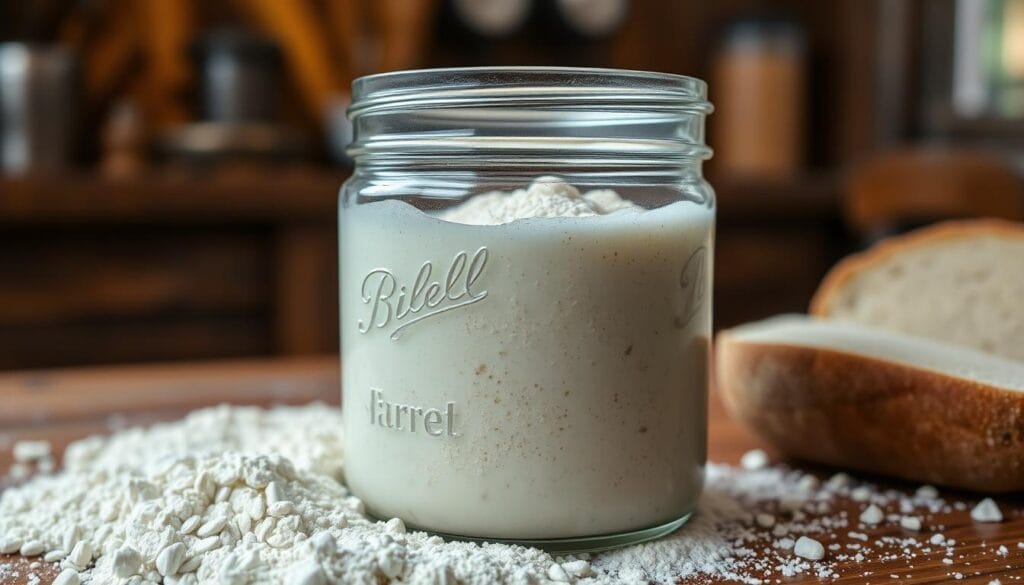Growing up, the smell of freshly baked bread was comforting. Now, I love sourdough bread for its flavor and health perks. Its ancient roots and natural fermentation make it special. But some might wonder, “Is it OK to eat sourdough bread?” In this guide, we’ll explore sourdough’s nutritional benefits and answer that question. We’ll see why it’s a good choice for your diet and how its unique fermentation process makes it easier to digest while offering a rich, tangy flavor.
Understanding Sourdough Bread: Ancient Origins and Modern Appeal
Sourdough bread has a long history, dating back to ancient times. It’s made with a special starter that has wild yeast and live bacteria. This natural process makes it taste different and offers health benefits.
What Makes Sourdough Different from Regular Bread
The main difference is how it’s made. Regular bread rises fast, but sourdough takes longer. This slow rise lets the starter break down the bread, making it taste more complex.
The Natural Fermentation Process
- Sourdough starters are unique to each place, showing the local microbes. They affect the bread’s taste, rise, texture, and crust.
- The natural process creates carbon dioxide. This makes the bread rise without commercial yeast.
- Sourdough doesn’t need preservatives or additives. The fermentation process preserves the loaf naturally.
Traditional vs Commercial Preparation Methods
Traditional sourdough takes longer to make, sometimes weeks. This lets the natural yeasts and bacteria fully develop the flavors. Commercial methods might use shortcuts to speed up production.

In the late 20th century and early 21st century, sourdough baking became popular again. People love its unique taste, texture, and health benefits from the natural process.
The Nutritional Profile of Sourdough Bread
Sourdough bread is known for its unique taste and texture. It also has a nutritional profile that stands out. If you’re looking for a healthier bread option or curious about its benefits, learning about sourdough’s nutrition is interesting.
A slice of sourdough bread (about 50 grams) has 84-130 calories. It also has 16-25 grams of carbs, 1 gram of fiber, 3-4 grams of protein, and 1 gram of fat. Plus, it can give you up to 15% of your daily folic acid and 7% of your iron.
The fermentation process in sourdough makes minerals like calcium, sodium, and zinc easier to absorb. This means your body gets more nutrients from sourdough than other breads.
Choosing whole-grain sourdough adds more fiber, protein, and nutrients. These options are great for a healthy digestive system and overall health.
| Nutrient | Amount per Slice (50g) | % Daily Value |
|---|---|---|
| Calories | 84-130 | – |
| Carbohydrates | 16-25g | – |
| Fiber | 1g | – |
| Protein | 3-4g | – |
| Fat | 1g | – |
| Folic Acid | 15% | – |
| Iron | 7% | – |
Whether you’re on a sourdough bread diet or just adding it to your meals, knowing its sourdough nutrition is key. It helps you choose better for a healthier digestive system.

Is It OK to Eat Sourdough Bread: Expert Insights and Research
Most people can safely eat sourdough bread. It’s good for a healthy diet, even for those with mild gluten sensitivity. But, those with celiac disease should not eat sourdough made with gluten.
Daily Recommended Portions
The right amount of sourdough bread varies by person. It’s good for blood sugar control, which is great for diabetes patients.
Who Should Consider Eating Sourdough
- People with mild gluten sensitivity
- Individuals looking to improve gut health
- Those aiming to manage blood sugar levels and diabetes
- Consumers seeking a more natural and minimally processed bread option
Potential Concerns and Considerations
While sourdough is mostly safe, there are some things to think about. People with celiac disease should not eat it because it still has gluten. Also, those sensitive to yeast might find sourdough better than regular bread.
Experts say sourdough is good for most people’s diets. Knowing its benefits can help you make better food choices for your health.

| Market Segment | Market Share (2023) |
|---|---|
| Starter Type |
|
| Ingredients |
|
| Application |
|
Digestive Benefits and Gut Health Advantages
Sourdough bread might be easier on your stomach than regular bread. This is because of the fermentation process. It breaks down phytic acid and degrades gluten, which can upset some stomachs.
Sourdough also has prebiotic fibers. These fibers feed the good bacteria in your gut. This can make your gut health better and help those with irritable bowel syndrome (IBS).
The fermentation process also makes sourdough bread good for your gut. Eating sourdough can help your digestive system and improve your overall health.
Sourdough’s Impact on Gut Health
- Improved Digestibility: The fermentation process breaks down complex carbs and proteins. This makes sourdough bread easier to digest.
- Prebiotic Fibers: Sourdough has prebiotic fibers. These fibers feed the good bacteria in your gut, helping your microbiome.
- Probiotic-like Properties: The fermentation process gives sourdough bread probiotic-like qualities. This supports your gut health.
- IBS Tolerance: Some people with irritable bowel syndrome (IBS) find sourdough bread easier to digest than other breads.
While sourdough bread is a healthier option, remember to eat it in moderation. Too much of any bread, even sourdough, might not be the best for your health. It’s important to enjoy sourdough as part of a balanced diet.
Blood Sugar Management and Glycemic Impact
Sourdough bread is great for managing blood sugar. It doesn’t cause quick spikes in blood glucose like regular bread does. Sourdough has a glycemic index of 54, which is lower than regular bread’s 71.
This slower rise in blood sugar makes sourdough a better choice. It’s good for people with diabetes or those watching their blood sugar.
Comparing Glycemic Index with Other Breads
The way sourdough is made creates resistant starches. These take longer to digest. This helps control hunger and aids in weight management by making you feel full.
Whole wheat sourdough also has more fiber. This lowers its glycemic impact even more.
On the other hand, breads made with commercial yeast or added sugars have a higher glycemic index. They cause bigger blood sugar spikes. Choosing sourdough over these can help manage diabetes and keep blood glucose stable.
Benefits for Diabetes Management
For people with type 2 diabetes, sourdough bread can be a big help. Its low glycemic index and high resistant starch content help control blood sugar levels and insulin levels. This reduces the risk of blood sugar crashes and energy ups and downs.
- Studies show sourdough bread may improve insulin sensitivity. This makes it easier for the body to manage blood glucose.
- Whole grain sourdough’s high fiber content slows down carbohydrate absorption. This helps keep blood sugar levels stable.
- Eating sourdough bread, especially in the evening, is good for type 2 diabetes patients. They often have more insulin resistance in the morning.
Adding sourdough bread to a balanced diet helps people with diabetes. They can enjoy bread’s taste while managing their blood sugar levels and staying healthy.
Enhanced Nutrient Absorption and Bioavailability
Sourdough bread is more than just tasty. It’s also packed with nutrients. The way it’s made boosts the body’s ability to use vitamins and minerals.
Lactic acid bacteria in sourdough make an enzyme called phytase. This enzyme breaks down phytic acid. Phytic acid can block the body from getting minerals like calcium, iron, and zinc. So, sourdough can make these nutrients up to 70% more available.
Sourdough also has more resistant starches. These help your gut and support good bacteria. It’s a great choice for better digestion and gut health.
| Nutrient | Sourdough Bread | Conventional Bread |
|---|---|---|
| Zinc | 0.924 mg | 0.703 mg |
| Magnesium | 27.1 mg | 22.4 mg |
| Iron | 1.61 mg | 1.28 mg |
| Folate | 31.9 mcg | 24.8 mcg |
The making of sourdough bread also increases bioactive peptides and antioxidants. These can help fight stress and inflammation. So, sourdough is a great choice for staying healthy.
The Role of Sourdough in Weight Management
Adding sourdough bread to your meals might help with weight control. It has less gluten than other breads, which is good for those sensitive to gluten. Its special way of being made also means it doesn’t raise blood sugar as much. This can stop cravings and help you eat less.
Satiety and Portion Control
Sourdough bread is full of resistant starch, a fiber that makes you feel full. It’s digested slowly, so you stay full longer. This can help you eat less between meals, which is great for keeping a healthy weight.
Metabolic Benefits of Fermented Foods
Foods like sourdough bread are good for your metabolism. This can help you manage your weight better. The way sourdough is made adds good bacteria and enzymes. These help your body use nutrients better and keep your gut healthy.
Adding sourdough bread to your meals can help you reach your weight goals. It makes you feel full, keeps blood sugar steady, and might even help your metabolism. So, sourdough bread is a smart choice for a healthy sourdough bread diet.
Safe Consumption and Storage Guidelines
Enjoying sourdough bread is fun and healthy. It’s safe for most people because of its special fermentation. This makes it acidic.
Sourdough bread lasts longer than regular bread. It’s because the acid stops mold. Store it in a paper bag or bread box at room temperature for 4-5 days. You can freeze it for up to 3 months if you slice it first. Always check for mold before eating.
If you have celiac disease or gluten intolerance, choose gluten-free sourdough. Traditional sourdough has wheat gluten. Gluten-free options can be stored and eaten like regular sourdough.
| Storage Method | Shelf Life |
|---|---|
| Room temperature (paper bag or bread box) | 4-5 days |
| Frozen (sliced) | Up to 3 months |
Follow these guidelines to enjoy eating sourdough safely. You’ll get all the sourdough bread health benefits. And you’ll know your sourdough bread is safe to eat.
Conclusion
Sourdough bread is good for your health. It’s made in a special way that helps your body digest it better. This can lead to better nutrient absorption and blood sugar control.
But, sourdough isn’t for everyone. People with celiac disease should avoid it. Yet, those with mild gluten sensitivity might find it easier to eat.
Eating sourdough can make you feel better. It supports your gut health and reduces inflammation. Plus, it’s full of vitamins and minerals.
Adding sourdough to your diet is easy and healthy. You can enjoy it for breakfast, lunch, or as a snack. It’s a tasty way to take care of your health.
FAQ
What makes sourdough bread different from regular bread?
Sourdough bread uses wild yeast and bacteria for fermentation. Regular bread uses commercial yeast. This makes sourdough taste, texture, and nutrition unique.
What are the health benefits of eating sourdough bread?
Sourdough bread boosts gut health and nutrient absorption. It has a lower glycemic impact than regular bread. The fermentation process makes minerals more available and adds prebiotic fibers for a healthy gut.
Is sourdough bread suitable for those with gluten sensitivity?
Some with mild gluten sensitivity might find sourdough easier to digest. But, those with celiac disease should avoid it because it’s made with gluten.
How does the glycemic index of sourdough bread compare to other breads?
Sourdough bread has a glycemic index of 54, lower than regular bread’s 71. This means it raises blood sugar levels more slowly. It’s good for managing blood sugar, especially for diabetics.
How can sourdough bread support weight management?
Sourdough’s high resistant starch and slow digestion can make you feel fuller. It helps control portions and keeps blood sugar steady. This can aid in weight management over time.
Is sourdough bread safe for consumption and how should it be stored?
Sourdough bread is safe for most people. Its acidic nature helps it last longer than regular bread. Store it at room temperature in a paper bag or bread box for 4-5 days. Or, slice and freeze for up to 3 months.

